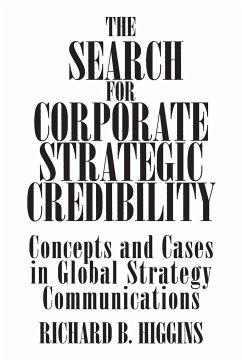Higgins makes clear that corporate strategy, regardless of how elegantly conceived, how comprehensive its scope or how forward-looking its thrust, does not provide competitive advantage until it is communicated, understood, valued, and acted upon by a variety of key corporate stakeholders. His book is thus developed to advance the theory and practice of corporate strategy communications. With two chapters devoted to conceptual foundations and empirical research, plus five new case studies illustrating his points, Higgins's book not only builds on existing research in strategic planning and management and reputation management, but offers new research findings as well. Interdisciplinary, integrative, and international in scope, the book will be of special interest to corporate management, strategic planners, corporate communications and investor relations executives, and other professionals in the investment community, and to academics with similar research and teaching interests. Higgins argues that companies that communicate effectively to key constituencies risk less by making their strategies known than by hiding them. Among the important payoffs Higgins identifies are an improved climate within the investment community; better relationships with suppliers, customers, and strategic partners; improved employee morale and motivation; and, in some cases, a boost to share price and the enhancement of shareholder value. He begins with an overall strategic framework, illustrating how effective corporate strategy communications can improve a firm's strategic credibility, then follows with case studies-unavailable until now-each written specifically for this book, and covering such situations as a merger, a failed takeover attempt, and a management campaign to elevate share price and shareholder value at a major chemical company. He ends with an examination of the international challenges and opportunities involved in cross-cultural strategy communications. The book also presents for the first time, the results of a major international study of corporate strategy communications. Included in this study were 1800 executives and analysts from the U.S., Europe, and Japan. The job of strategy communications is never done, concludes Higgins. Communications during bad times, as well as good, are critically important.
Hinweis: Dieser Artikel kann nur an eine deutsche Lieferadresse ausgeliefert werden.
Hinweis: Dieser Artikel kann nur an eine deutsche Lieferadresse ausgeliefert werden.








